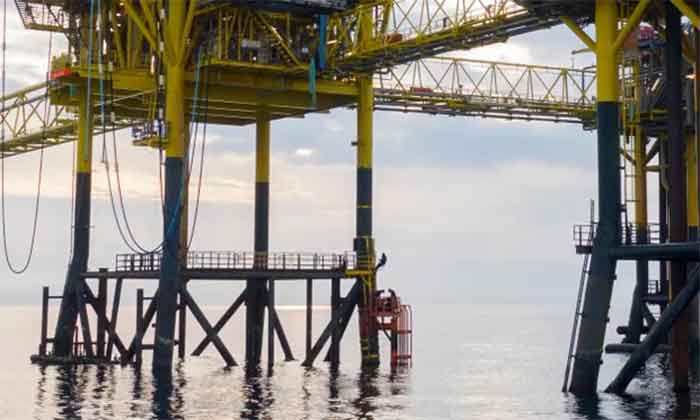
Denmark has decided to end all oil and gas activities in the North Sea by 2050 and has cancelled its latest licensing round, saying the country is “now putting an end to the fossil fuel era.”
“We are now putting a final end to the fossil era,” said Denmark’s climate minister Dan Joergensen, a Social Democrat.
Greenpeace called it “a landmark decision toward the necessary phase-out of fossil fuels.”
“This is a huge victory for the climate movement,” said Helene Hagel of Greenpeace Denmark. Wealthy Denmark has “a moral obligation to end the search for new oil to send a clear signal that the world can and must act to meet the Paris Agreement and mitigate the climate crisis.”
The Danish Parliament voted late Thursday to end offshore gas and oil extraction, which had started in 1972 and made the country the largest producer in the European Union. Non EU-members Norway and Britain are larger producers, with a bigger presence in the North Sea.
Denmark is currently the largest oil producer in the European Union, although it produces much less than non-EU members Norway or the UK.
Denmark this year estimated to pump a bit over 100,000 barrels of crude oil and oil equivalents a day, according to the government.
That is relatively little in a global context. The U.K. produces about ten times that amount while the U.S., the world’s largest producer, pumped over 19 million barrels of oil a day last year. Environmental activists nevertheless said the move was significant as it shows the way forward in the fight against climate change.
The 2015 landmark Paris climate deal asks both rich and poor countries to take action to curb the rise in global temperatures that is melting glaciers, raising sea levels and shifting rainfall patterns. It requires governments to present national plans to reduce emissions to limit global temperature rise to well below 2 degrees Celsius.
Denmark has been an early adopter of wind power, with more than a third of its electricity production deriving from wind turbines. They are considered key in the transformation of the energy system and should enable Denmark to no longer be dependent on fossil fuels in 2050 for electricity production.
The agreement to end oil and gas extraction means that a planned eighth licensing round and any future tenders have been cancelled and makes 2050 the last year in which to extract fossil fuels in the North Sea.
Both the left-leaning parties and the center-right opposition, suggesting the policy is unlikely to be reversed, backed it.
“It is incredibly important that we now have a broad majority behind the agreement, so that there is no longer any doubt about the possibilities and conditions in the North Sea,” said the climate minister.
According to official figures, the move would mean an estimated total loss for Denmark of 13 billion kroner ($2.1 billion). The industry has earned the small Scandinavian country over 500 billion kroner ($81.5 billion) since the 1970s.
In October, energy group Total pulled out of the latest tender process leaving only one applicant, Ardent Oil, according to authorities.
In June, the Danish Council on Climate Change – an independent body that advises the government – recommended ending any future exploration in the North Sea, saying a continuation would hurt the country’s ambitions as a front-runner on fighting climate change.
There are 55 drilling platforms on Denmark’s territory, across 20 oil and gas fields.
“We’re the European Union’s biggest oil producer and this decision will therefore resonate around the world,” the climate minister Dan Jorgensen said on Thursday.
“We want to be climate neutral in 2050. And if we are to have any credibility in that, then this is a necessary decision,” the minister said.
When the current government came to power, Prime Minister Mette Frederiksen called it “the first climate election.”
Recently it has faced criticism for not taking more ambitious steps to reach its climate goal. This latest decision now sends a stronger message.
Economic factors have played a role. Lower oil prices and higher costs have seen interest wane in the latest round of oil bloc tenders.
Even so, about 4,000 jobs depend on the sector, mostly on Denmark’s west coast.
As part of the new plan, the climate minister said carbon capture and storage technology will be developed in the area, and new job creation will come from the country’s growing offshore wind sector.
Denmark is regarded as having one of the world’s most ambitious climate targets.
It aims to reduce greenhouse gas emissions from 1990 levels by 70% by 2030, as well as reach net zero emissions by 2050 – both targets which have been passed into law.
Scientists have said, however, that even if the UK and other nations keep their promises on cutting emissions there was no guarantee the world would avoid serious global warming.
Danish oil production, which began in 1972, has been on the decline for several years, and has been halved in the past decade.
Its gas production has also become minimal, at 3.2 billion cubic meters last year.
Denmark’s oil fields are located about 150 kilometers off its west coast, near its maritime borders with Britain and Norway.
SIGN UP FOR COUNTERCURRENTS DAILY NEWSLETTER










































